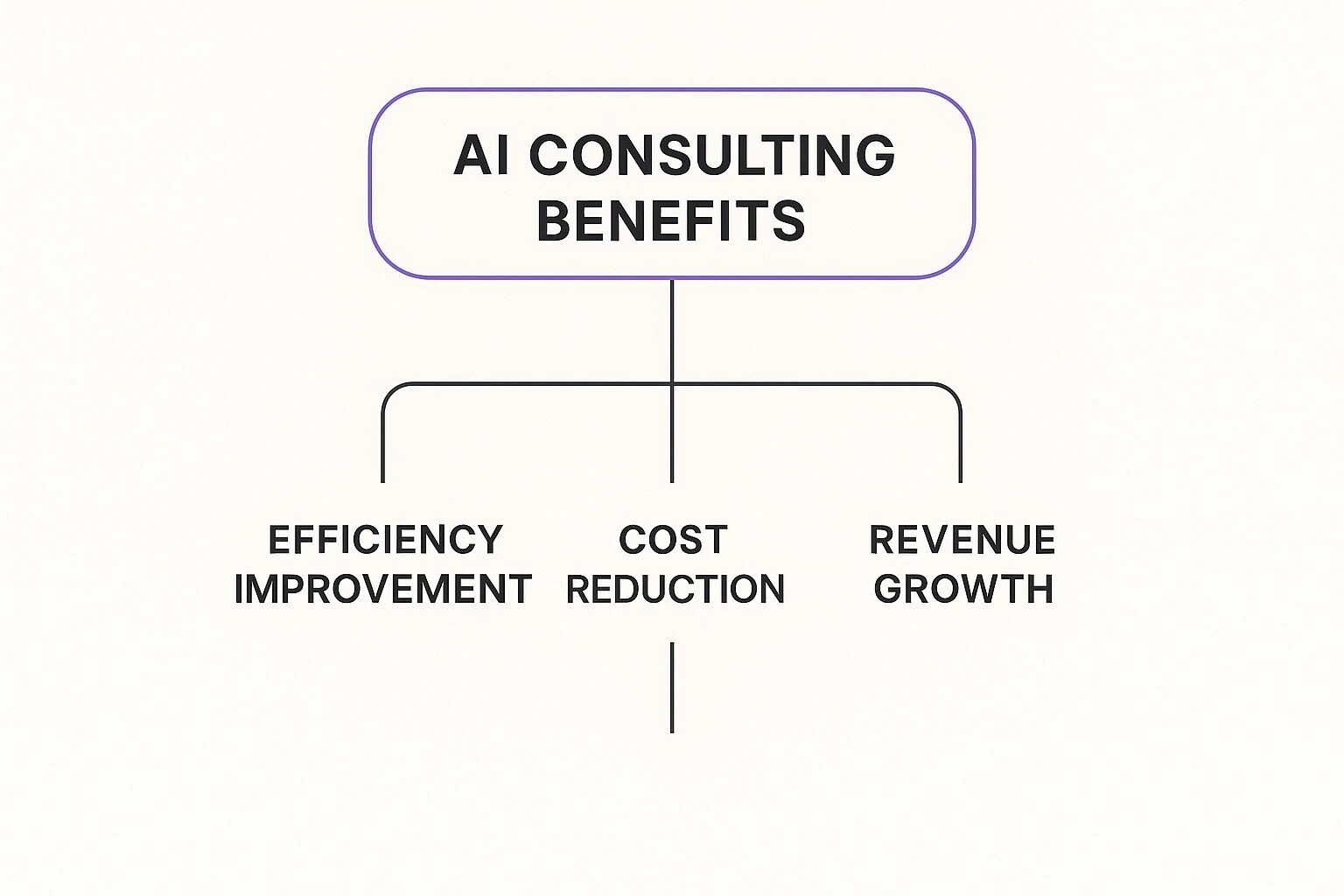A Guide to AI Consulting Services
Our guide to AI consulting services covers strategy, benefits, use cases, and how to choose the right partner for your needs.

The point of an ai consultant is to connect your business objectives with the raw technical power of artificial intelligence. Think of it as a bridge, translating complex tech talk into real-world outcomes like better efficiency or new ways to make money. This isn’t about simply buying some off-the-shelf software. It’s about a guided, purposeful change in how your business operates.
What Are AI Consulting Services?

Many organisations see artificial intelligence as some kind of complex animal reserved for global tech giants. The truth is, AI consulting services are there to demystify the entire field, making it practical and accessible for businesses of any size. Their core function is simple: to draw up a clear blueprint that makes sure every dollar you spend on AI delivers a tangible, measurable result.
It helps to think of an AI consultant like an architect. An architect doesn’t start a project by ordering a truckload of bricks. First, they take the time to understand the purpose of the building, what the people inside will need, and the constraints of the land. An AI consultant works in precisely the same way, but their focus is on your business processes.
Bridging Technology and Business Objectives
The most critical role of an AI consultant is to act as a translator. They need to be fluent in the language of both the boardroom and the data science lab, ensuring that highly technical projects are perfectly aligned with what the business is trying to achieve. It’s this alignment that prevents those expensive blunders where a cool piece of tech gets implemented without any clear purpose or ROI.
This kind of strategic guidance is becoming absolutely essential. The Australian consulting market, which includes these AI specialisations, was valued at around USD 9.1 billion and is forecast to hit USD 18.8 billion by 2034. This explosive growth is being driven by a huge push towards digitalisation across Australian industries. As you can imagine, this creates a massive demand for experts who know how to navigate new IT infrastructure, data analytics, and AI. You can find more detail on this in the Australian consulting market forecast on marketresearch.com.
At its core, AI consulting is less about procuring technology and more about guided, strategic business transformation. It’s about converting the abstract potential of AI into concrete outcomes that strengthen your bottom line.
Beyond the Buzzwords to Tangible Value
So, what does this actually look like on the ground? A proper AI consulting engagement moves past the abstract talk of “machine learning” or “neural networks” and gets right down to solving specific, painful problems. These services help businesses get real results, such as:
- Operational Efficiency: Pinpointing and automating those repetitive, soul-crushing tasks to free up your team for more strategic work.
- Superior Customer Experiences: Using data to personalise every interaction, anticipate customer needs, and provide support before they even ask for it.
- New Revenue Streams: Digging into your data to uncover hidden opportunities for brand-new products or services you hadn’t even considered.
- Informed Decision-Making: Building systems that can sift through enormous datasets and spit out clear, actionable recommendations for your leadership team.
Ultimately, bringing in AI consultants is about gaining a strategic partner. They bring the expertise, the roadmap, and the technical muscle you need to turn the promise of artificial intelligence into a genuine, sustainable competitive advantage.
When you start looking into artificial intelligence, you quickly realise it’s not just about flipping a switch. You need a clear understanding of the specific services that can turn a good idea into a practical, valuable tool for your business. An AI consulting services firm doesn’t offer a one-size-fits-all product; instead, they provide a suite of specialised skills designed to guide you through every stage of your AI journey.
Any good engagement starts with a conversation, not a sales pitch about technology. This initial planning phase is critical. It ensures that every technical step taken is directly linked to a real, measurable business goal. This is how you avoid those expensive, dead-end projects that go nowhere.
It’s all about building a hierarchy of benefits, starting with efficiency gains and moving towards genuine growth. A well-structured AI consulting engagement delivers on this promise by turning high-level ambitions into a concrete plan of action.

This visual really captures how the benefits stack up. You start with foundational improvements like cost savings, which then pave the way for the ultimate goal: driving real revenue growth.
To give you a clearer picture, let’s break down the typical services offered by an AI consultant. The table below outlines these core offerings, explaining what each one sets out to achieve and the tangible business outcome you can expect.
Key AI Consulting Service Offerings
| Service Offering | Primary Objective | Key Business Outcome |
|---|---|---|
| AI Strategy & Roadmap | To identify high-impact AI opportunities and create a prioritised implementation plan. | A clear, actionable blueprint that aligns AI initiatives with long-term business goals. |
| Data Readiness & Infrastructure | To assess and fortify the organisation’s data, systems, and technical foundations. | A robust and scalable infrastructure ready to support demanding AI applications. |
| Custom AI Model Development | To build, train, and deploy bespoke AI models for unique business challenges. | A competitive edge through proprietary AI solutions that solve specific operational problems. |
| AI Governance & Ethics | To establish frameworks for responsible AI use, ensuring compliance and mitigating risk. | Enhanced brand trust, regulatory compliance, and protection against reputational damage. |
This breakdown shows how each service builds on the last, creating a comprehensive approach to AI adoption that’s built for success.
AI Strategy and Roadmap Development
Without a doubt, the most critical service is AI Strategy and Roadmap Development. This is where consultants sit down with your leadership team to dig deep into your operations and pinpoint the best opportunities for AI. It’s an intensive look at your business model, your market position, and where you want to be in five years.
The outcome is a clear, prioritised roadmap. This document isn’t just a wish list; it’s a strategic blueprint that details which AI projects to tackle, in what order, and how you’ll measure success with the right key performance indicators (KPIs).
Think of an AI roadmap like a detailed itinerary for a cross-country trip. It doesn’t just point to the destination. It maps out the most efficient route, plans for fuel stops (your data and resources), and anticipates potential roadblocks to make sure you arrive on time and on budget.
Data Readiness and Infrastructure Assessment
At its core, AI runs on data. You can have the most sophisticated algorithm in the world, but without clean, accessible data, it’s completely useless. That’s why a Data Readiness and Infrastructure Assessment is a foundational service. It’s a health check for your organisation’s ability to actually support AI.
Consultants will pore over your existing data sources, storage systems, and IT setup. They find the gaps, suggest improvements to your data governance, and make sure your technical backbone is strong enough to handle the heavy lifting of training and running AI models.
Many firms also specialise in implementing solutions like AI-powered workflow automation to make day-to-day operations smoother and more efficient. This often fits into a wider strategy of improving operational flow, a topic we cover in more detail in our guide explaining https://osher.com.au/blog/what-is-business-process-automation/.
Custom AI Model Development and Integration
While off-the-shelf tools are great for some things, unique business problems often demand unique solutions. This is where Custom AI Model Development comes in. It’s the process of building, training, and fine-tuning machine learning models that are tailored specifically to your data and your goals.
This could mean creating things like:
- A predictive maintenance model for a manufacturing facility.
- A sophisticated fraud detection algorithm for a financial services firm.
- A personalised recommendation engine for an e-commerce site.
After a model is built, it has to be carefully integrated into your existing systems and workflows. If it isn’t easy for your team to use, it won’t deliver any real value. This push for tailored AI is a huge driver of growth in Australia, with the applied AI services market projected to jump from USD 13.3 million to USD 58.1 million by 2030. It’s clear that Australian businesses are hungry for custom solutions.
AI Governance, Ethics, and Risk Management
Finally, using AI responsibly is non-negotiable. An absolutely essential service is establishing solid AI Governance and Ethics frameworks. Consultants help you navigate the tricky territory of data privacy rules, potential algorithmic bias, and the ethical weight of AI-driven decisions.
This proactive approach to risk management is about protecting your brand’s reputation and ensuring you’re compliant, which builds crucial trust with both your customers and regulators.
Business Benefits of Engaging AI Consultants

Knowing what an AI consulting firm does is one thing; truly understanding the direct, measurable impact one can have on your business is another. Bringing in AI consulting services isn’t just a technology purchase. Think of it as a strategic investment aimed at delivering specific, valuable returns.
The key advantages really boil down to speed, smarter risk management, and building a stronger organisation for the long haul.
One of the most immediate perks is a dramatically faster time-to-value. Going it alone on an AI project almost always means a long, expensive period of trial and error. Consultants arrive with a proven playbook, helping your business sidestep common pitfalls and technical dead ends. This ensures your first AI initiative actually delivers results, and does so much faster.
This speed isn’t just about convenience. It has a direct financial impact, allowing your business to start reaping the rewards of automation, improved efficiency, or new revenue streams far sooner.
Strategic Risk Mitigation and Governance
Diving into artificial intelligence naturally introduces a new set of complex risks. These can range from navigating Australia’s tough data privacy laws to managing the ethical dilemmas of algorithmic decision-making. AI consultants are your expert navigators in this tricky territory.
They help you build solid governance frameworks to make sure your AI systems are fair, transparent, and compliant. This isn’t just about avoiding penalties; it’s about protecting your brand’s reputation and building genuine trust with your customers.
A study on the impact of AI tools in professional services found that their proper implementation could lead to a 344% projected ROI over three years, with a payback period of less than six months. This highlights the immense financial upside of getting AI deployment right from the start.
This structured approach also covers technical and operational risks. By validating data quality, testing models with rigour, and ensuring a smooth integration, consultants drastically lower the chances of project failure and protect your investment.
Driving Operational Efficiency and Cost Savings
At its heart, a major goal for any AI project is to become more efficient. AI consultants are masters at spotting processes that are ripe for an upgrade, from automating tedious data entry to untangling complex supply chains. They implement solutions that cut operational costs and, importantly, free up your talented people to focus on more valuable work.
Consider these common outcomes:
- Reduced Manual Labour: Automating repetitive tasks can reclaim thousands of staff hours each year, leading to major cost reductions. A great example of this is seen in process automation, a topic you can explore further in our guide explaining what is robotic process automation.
- Improved Accuracy: AI models can perform tasks like data analysis with a level of precision humans simply can’t sustain, which cuts down on costly mistakes.
- Optimised Resource Allocation: Predictive analytics can help businesses manage inventory, staffing, and other resources more effectively, preventing waste and trimming expenses.
For example, one legal firm using an AI tool found it could recover up to $6.2 million in previously written-off research fees over three years, simply by making junior associates more efficient.
Fostering a Lasting Culture of Innovation
Perhaps the most enduring benefit of working with AI consultants is the knowledge transfer that takes place. A good partnership does more than just deliver a project; it upskills your own team and helps you build a sustainable, data-driven capability from within.
Consultants work shoulder-to-shoulder with your employees, training them on new tools and methods. This process demystifies AI, embedding a culture of continuous improvement that sticks around long after the consultants have left.
This creates an environment where your team feels empowered to spot new opportunities for AI and experiment with new ideas. Ultimately, this builds a powerful, long-term competitive advantage that transforms your business from the inside out.
Real-World AI Consulting Use Cases
It’s easy to talk about AI in abstract terms, but that doesn’t really hit home. The true power of AI consulting services shines when you look at how they solve concrete, high-stakes problems for real companies. It’s about turning theoretical potential into something you can actually measure on the balance sheet, and we’re seeing this happen right across Australian industries.
The examples below aren’t just hypotheticals. They show a clear path from a pressing business challenge to a smart, AI-driven solution, highlighting the initial pain point, the consultant’s approach, and the impressive results.
Driving Growth in Retail with AI Personalisation
An established Australian retailer was grappling with a classic problem: customer churn. Their marketing felt generic and wasn’t connecting with individual shoppers. The result? Low engagement and a customer lifetime value (CLV) that had completely flatlined. They knew personalisation was the key, but they just didn’t have the in-house chops to build a system that was genuinely dynamic.
This is where their AI consulting partners came in. The project kicked off with a deep dive into the retailer’s sales data, customer behaviour analytics, and the marketing technology they were already using. The consultants pinpointed the crucial data points that could predict what a customer might buy next.
The process looked like this:
- Data Aggregation and Cleaning: They first had to pull together customer data from all over the place—online sales, in-store purchases, email clicks—and whip it into a single, usable format.
- Model Development: Next, they built a bespoke machine learning model to generate real-time product recommendations and personalised offers for every single customer.
- System Integration: Finally, this new AI engine was plugged directly into the company’s e-commerce platform and email marketing tools, making the new insights actionable.
The outcome was a complete turnaround for their marketing. Within just six months, the retailer saw a 15% increase in customer lifetime value and a 22% lift in conversion rates from their newly personalised email campaigns.
Fortifying Financial Services Against Fraud
A mid-sized financial services firm was losing the battle against increasingly sophisticated online fraud. Their old, rule-based system was slow, flagged far too many legitimate transactions (false positives), and simply couldn’t keep up with new scam tactics. This was costing them dearly, both in direct financial losses and in customer frustration.
By bringing in AI consultants, they were able to build and deploy a modern, AI-powered fraud detection system. The first order of business for the consulting team was to analyse mountains of historical transaction data, hunting for the subtle patterns that scream “fraud.” They quickly realised that a combination of different machine learning models would be the most effective defence.
The goal wasn’t just to spot the old, familiar fraud patterns. It was to build a system that could predict and flag brand-new threats in real time. This kind of proactive defence is what separates truly effective AI from the rest.
The project delivered a system that could analyse transactions on the fly. This new platform dramatically cut down on the “noise” from false alerts, freeing up the firm’s fraud team to focus on real threats. The numbers speak for themselves: the firm reported a staggering 60% reduction in financial losses from fraud within the first year.
Slashing Downtime in Manufacturing with Predictive Maintenance
For a manufacturing business operating in a tough market, unplanned equipment downtime was a killer. It caused huge costs and threw production schedules into chaos. Relying on reactive maintenance—fixing things after they break—was clearly not working. They turned to AI consulting services to help them build a predictive maintenance solution.
Consultants worked side-by-side with the factory floor team to install sensors on critical machinery. These sensors gathered a constant stream of data on things like temperature, vibration, and performance. All of this data was then fed into a custom-built AI model designed to do one thing: predict equipment failures before they happen.
This move towards predictive solutions reflects a wider trend. While global AI consulting markets are booming, the Australian market has its own unique flavour. Here, growth is steady and supported by government initiatives and a strong focus on building AI that is compliant and trustworthy. This environment is especially good for SMEs, who are projected to increase their AI consulting spend by over 25% as they discover how these partnerships make complex projects manageable and highly profitable. You can find a deeper dive in the market analysis from Future Market Insights.
This new predictive power meant the maintenance team could schedule repairs proactively, during planned downtime, instead of scrambling to fix a machine in the middle of a critical production run. The impact was massive: an 85% reduction in unplanned downtime and hundreds of thousands of dollars saved in emergency repair bills and lost production.
How to Choose the Right AI Consulting Partner

Picking the right partner is arguably the single most critical step you’ll take. It’s a decision that will profoundly shape the success, or failure, of your entire AI initiative. This isn’t just about hiring a vendor; it’s about finding a strategic ally whose expertise, working style, and even culture clicks with your own. You need a solid evaluation plan to see past the polished sales presentations and find a firm that’s genuinely capable.
Get this choice wrong, and you could be looking at a wasted investment, a project that goes nowhere, and a company-wide disillusionment with AI’s potential. But the right partnership? That accelerates everything. It helps you dodge common pitfalls and builds lasting AI skills within your own team. This demands a critical eye and a structured way to vet potential partners.
It’s a balancing act between raw technical talent and deep industry knowledge. A firm might employ world-class data scientists, but if they don’t grasp the unique pressures of your sector—be it finance, retail, or manufacturing—the solutions they build are likely to miss the mark in the real world.
Evaluating Technical Expertise and Industry Acumen
The first thing to look at is a firm’s technical chops and their experience in your specific industry. Real expertise in AI consulting services isn’t proven by a long list of buzzwords. It’s proven by a portfolio of projects where they solved tangible business problems.
Find a partner who speaks your language from day one. They should already understand your industry’s regulations, competitive landscape, and operational quirks without you having to give them a crash course. This specific knowledge is what allows them to design AI solutions that actually fit into your workflows and produce real value.
When you’re assessing their technical team, don’t be shy. Ask direct questions about their data scientists, machine learning engineers, and project managers. You need to know about their hands-on experience with the types of AI relevant to your goals, whether that’s natural language processing (NLP), computer vision, or predictive analytics.
One of the most telling parts of the vetting process is understanding how a consultant handles knowledge transfer. The best partners work to make themselves redundant by empowering your team, not to create a permanent dependency.
You also need to be sure they can handle the technical messiness of a large organisation. A great AI model is useless if it can’t be securely and efficiently integrated with your existing systems. Digging into topics like AI adoption in the enterprise can give you a better framework for these kinds of discussions.
Scrutinising Methodology and Communication
A firm’s project methodology is a window into their soul. A transparent, agile, and collaborative approach is usually a sign of a healthy partnership. Ask them to walk you through a typical project, from the initial discovery and data checks all the way to model deployment and ongoing support.
Clear, consistent communication is completely non-negotiable. Right from the start, there should be a defined plan for regular check-ins, progress reports, and who to contact for what. This ensures you’re never left wondering about the project’s status, potential roadblocks, or the budget.
To help structure your thinking, you can use a checklist to compare different firms you’re considering. It helps to keep your evaluation consistent and objective.
AI Consulting Partner Evaluation Checklist
This checklist provides a simple framework to compare potential partners across the most important criteria.
| Evaluation Criterion | What to Look For | Red Flags to Avoid |
|---|---|---|
| Industry Experience | Demonstrable success in your specific sector with relevant case studies. | Generic, one-size-fits-all solutions with no industry customisation. |
| Technical Depth | In-house experts with skills matched to your project’s needs. | Over-reliance on junior staff or outsourcing core technical work. |
| Project Methodology | A clear, agile framework with defined milestones and deliverables. | A vague or rigid process that doesn’t allow for collaboration or feedback. |
| Knowledge Transfer | A structured plan for upskilling your team and providing documentation. | Guarded expertise or a lack of interest in empowering your staff. |
| Client References | Willingness to provide contactable references from past clients. | Evasive answers or providing only curated, written testimonials. |
Using a table like this can surface discrepancies and make your final decision much clearer.
Interpreting Case Studies and Testimonials
Finally, you have to verify their track record. Case studies and client testimonials are great, but you need to look at them with a critical eye. Don’t just accept the glossy summaries they publish on their website.
Ask for the full story. A detailed case study should lay out the initial problem, the specific steps the consultants took, the hurdles they overcame, and—most importantly—the quantifiable business outcomes. Look for hard metrics like percentage gains in efficiency, revenue growth, or specific cost savings.
Whenever you can, ask to speak directly with one or two of their previous clients. A frank conversation can give you priceless insights into the firm’s communication style, problem-solving skills, and what it’s really like to work with them. This step alone can often be the deciding factor in making a confident choice.
Working Together: Engagement Models and Measuring Real-World ROI
Once you’ve decided to partner with an AI consulting firm, the conversation shifts to two critical questions: How will we work together, and what does success actually look like? Getting these two things right is non-negotiable. The engagement model you choose sets the entire tone for the project, defining the structure, cost, and how deeply your teams will be involved.
There’s no one-size-fits-all answer here. The best model really hinges on your project’s scope, your timeline, and the capabilities you already have in-house. A clear agreement from day one ensures everyone is on the same page.
Choosing the Right Engagement Model
Your partnership with an ai consulting services firm can be structured in a few different ways. Each has its own rhythm and is built for different business goals.
Let’s break down the common approaches:
- Project-Based: Think of this as the most clear-cut option. You define a specific job—like building a predictive analytics model or auditing your data infrastructure—with a set timeline and a fixed price. It’s perfect for one-off tasks where the deliverables are crystal clear. The biggest win here? No budget surprises.
- Retainer: If you’re looking for a long-term strategic partner, a retainer is the way to go. You pay a recurring fee for continuous access to expert advice. This is ideal for businesses that need ongoing help refining their AI roadmap, maintaining complex models, or simply having an expert on call to navigate the fast-changing ethical landscape.
- Staff Augmentation: Sometimes you have a great team but just one or two critical skill gaps. This model lets you embed specialised consultants directly into your existing crew. It’s a fantastic way to get hands-on expertise and transfer knowledge directly, but it does mean you’ll need to manage them as part of your internal team.
A Forrester study on AI adoption really drives this home. They found that successful projects can deliver a stunning 344% ROI over three years, often paying for themselves in less than six months. This just goes to show how much financial potential is on the table when you structure the engagement to hit clear, measurable targets.
Ultimately, picking the right model is a balancing act. You have to weigh your budget against your need for flexibility and long-term guidance. A well-defined, self-contained project naturally fits a fixed-price model, while an evolving, ambitious AI strategy almost always calls for a retainer.
Measuring the True Return on Your Investment
Justifying an AI consulting spend isn’t just about ticking off technical milestones. Real ROI is measured in tangible business outcomes. The smartest way to track this is by setting clear Key Performance Indicators (KPIs) before a single dollar is spent or a line of code is written.
You need to look at both financial gains and operational improvements. This two-pronged approach gives you a complete, honest picture of the value the project is delivering.
Financial and Operational Metrics
When you’re calculating ROI, it’s about more than just the money you save. It’s also about the new value you create.
Financial Metrics to Keep an Eye On:
- Cost Savings: This is often the easiest metric to see. It shows up when you automate tedious manual tasks, cut down on costly errors, or optimise how you use expensive resources.
- Revenue Growth: AI can directly fuel growth by uncovering new sales leads, improving customer loyalty, or powering personalised marketing that actually converts.
- Increased Profitability: By eliminating write-offs and freeing up your senior people to focus on strategic work, AI can have a direct impact on your profit margins. For instance, one analysis showed law firms could claw back up to $6.2 million in previously written-off fees over three years just by making their research processes more efficient with AI.
Operational Metrics to Track:
- Efficiency Gains: How much faster are things getting done? Measure the time saved on specific tasks, like slashing customer service response times or speeding up data analysis from days to hours.
- Improved Decision-Making Speed: Track how quickly your teams can go from raw data to confident, informed decisions.
- Reduced Error Rates: Keep an eye on the drop in human errors in areas like data entry, order processing, or quality control.
By defining these metrics at the outset, you’re not just hoping for success—you’re creating a roadmap to measure it. This gives you the hard data you need to track progress and confidently show every stakeholder the real value of your AI investment.
Got Questions About AI Consulting? We’ve Got Answers.
It’s only natural for business leaders to have a lot of questions when exploring artificial intelligence. Here are some straightforward answers to the questions we hear most often about AI consulting services.
How Long Until I See Results from AI?
Honestly, it depends. The timeline for seeing a tangible return from an AI investment can vary quite a bit. A tightly focused project, like automating a repetitive data entry task, could start showing efficiency gains in just a few months.
On the other hand, bigger strategic plays—think developing a custom predictive analytics engine from scratch—will naturally have a longer runway. The key is that a good consultant will structure the project to deliver early wins, building momentum and proving the concept’s value along the way.
The best AI consulting engagements are designed to deliver value in stages. This way, you aren’t left waiting years for a payoff. You see real, measurable improvements at each milestone, which validates the investment as the project moves forward.
Is My Business Too Small for AI Consulting?
Not at all. While the big corporations get most of the media attention, we find that small and medium-sized businesses are often perfectly positioned to benefit from AI. Consultants can pinpoint high-impact, affordable solutions that solve very specific problems, such as fine-tuning your inventory management or automating initial customer support chats.
The right partner won’t try to sell you a sledgehammer to crack a nut. They’ll focus on scalable solutions that solve today’s problems and can grow right alongside your business.
What Is the Biggest Risk in an AI Project?
It’s usually not a technical glitch. The single biggest risk we see is a fundamental disconnect between the AI solution and an actual business need. It’s incredibly easy to get dazzled by the technology itself and lose sight of the problem you’re trying to solve.
This is exactly why that initial strategy and roadmapping phase is so non-negotiable. It forces everyone to tie the project directly to a tangible, valuable business outcome, ensuring you’re building something useful, not just something cool.
Ready to explore how AI can tackle your company’s unique challenges? Osher Digital specialises in creating custom AI and automation solutions that deliver measurable results. Let’s talk about your goals today.
Jump to a section
Ready to streamline your operations?
Get in touch for a free consultation to see how we can streamline your operations and increase your productivity.